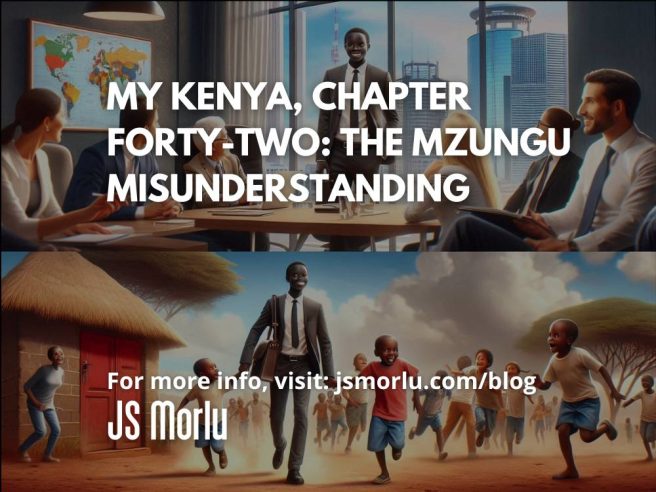By: John S. Morlu II, CPA
Coming to Kenya from America to meet a potential partner should have been simple. After all, we weren’t exactly selling powdered unicorn horns or Bitcoin mining rigs from Mars. We came bearing FinovatePro, Fixaars, Recksoft, and a suite of high-performance software tools engineered to solve real problems in accounting, reconciliation, and the skilled trades economy. Solid stuff. Global-class. No fluff.
But the first challenge wasn’t the tech. It wasn’t the pricing. It wasn’t even the value proposition. It was me.
More specifically, it was who they thought I was.
You see, my sponsor didn’t disclose my race. To the prospective client, I was coming from America—the mythical land of Mzungus. Naturally, the assumption was that I was white. And that assumption came with a whole suitcase of cultural skepticism: “Will he understand Kenya? Will he understand Africa? Will he get our hustle?”
Imagine the room’s surprise when I walked in: Black, rooted, and with a story woven from the soil of Africa itself.
Later, my assistant told me that the client had been nervous. “He’s American,” they said. “He might not understand us.” No one voiced it outright, but the fear was simple: a cultural mismatch.
Let’s pause here. Because this isn’t about racism. It’s culture. It’s nuance. It’s that quiet, complex dance between perception and identity.
In East Africa, “Mzungu” is a term of both affection and distance. Derived from Bantu roots, it originally meant “one who roams aimlessly” — describing early European explorers who wandered the land, map in one hand, confusion in the other. Today, it commonly refers to white people. But over time, it’s evolved. It can also mean foreigner. Outsider. Sometimes moneybag. Occasionally, clueless.
🎒 Fun Fact: In rural Kenya, children sometimes run after tourists shouting “Mzungu! Mzungu!” not because they’re being rude, but because they think every foreigner has chocolate in their backpack. And sometimes, they do.
📸 Satirical Tidbit: One expat blogger once wrote that the word “Mzungu” means “someone who pays double and doesn’t complain.” That might sting, but in tourist hotspots, it’s kind of true.
So when you come as a foreign investor, consultant, or entrepreneur, the burden isn’t just to prove your value — it’s to decode expectations. You might have the best software on the planet. But if the room silently doubts whether you can understand the price of maize, or the fear of power blackouts, or the speed at which Nairobi traffic can eat your soul, then your first job is not to pitch. It’s to connect.
That day, I skipped the product demo and told a story about growing up in Africa. About selling peanuts in traffic. About my first time wiring money through a chaotic remittance center. About eating jollof rice with a plastic spoon under a flickering bulb. Just embellishing stuff to “feel” connected.
The mood shifted.
It wasn’t that I became “less American.” It’s that I became familiar. And that made all the difference.
🗺️ Fun Fact: The original European explorers in East Africa were literally nicknamed “Wazungu” because they kept getting lost. Imagine getting immortalized as “The Lost Ones.” Now that’s branding.
💼 Sobering Insight: In global business, you don’t just carry your resume — you carry your identity, and your perceived ability to relate. If that’s missing, the door may stay politely shut.
Here’s the business lesson: Sometimes, the biggest barrier in African markets isn’t regulation or pricing. It’s perception. It’s trust. It’s proving that you’re not here to dictate, but to partner.
Would things have gone smoother if they knew upfront I wasn’t white? Maybe. But I’m grateful for how it unfolded. It reminded me that global business isn’t just about tech specs or spreadsheets. It’s about cultural fluency. Emotional intelligence. And the courage to walk into a room and start with your story, not your software.
And yes, the deal moved forward.
But more importantly, so did the conversation.
Because in the end, whether you’re Mzungu, Mwafrika, or Martian — people just want to be understood.
About the Author
John is an entrepreneur, strategist, and founder of JS Morlu, LLC, a Virginia based CPA firm with multiple software ventures including www.FinovatePro.com, www.Recksoft.com and www.Fixaars.com . With operations spanning multiple countries, John is on a mission to build global infrastructure that empowers small businesses, entrepreneurs, and professionals to thrive in an increasingly competitive world. He believes in hard truths, smart execution, and the relentless pursuit of excellence. When he’s not writing or building, he’s challenging someone to a productivity contest—or inventing software that automates it.
JS Morlu LLC is a top-tier accounting firm based in Woodbridge, Virginia, with a team of highly experienced and qualified CPAs and business advisors. We are dedicated to providing comprehensive accounting, tax, and business advisory services to clients throughout the Washington, D.C. Metro Area and the surrounding regions. With over a decade of experience, we have cultivated a deep understanding of our clients’ needs and aspirations. We recognize that our clients seek more than just value-added accounting services; they seek a trusted partner who can guide them towards achieving their business goals and personal financial well-being.
Talk to us || What our clients says about us




